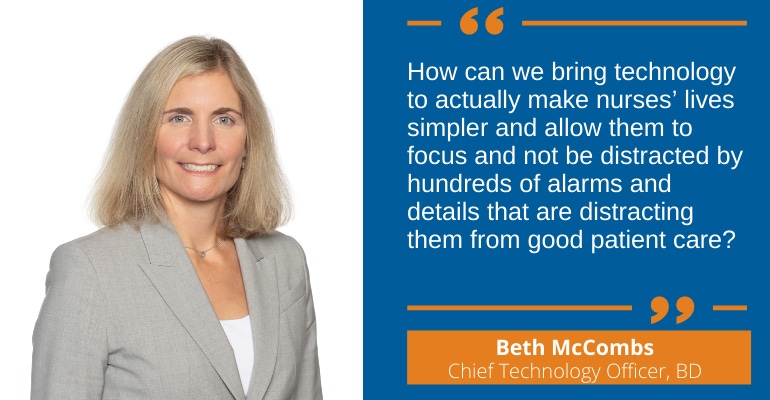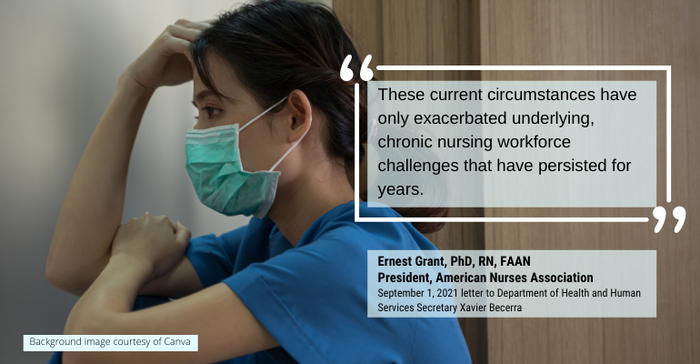The pandemic kickstarted three irreversible trends in care delivery that medical device companies like BD are already strategizing around.
March 18, 2022

Editor's note: This story has been updated to clarify the way BD is enabling new care settings for at-home testing and for blood collection outside of traditional phlebotomy settings, and to correct the spelling of BD's HealthSight offering.
It's no secret that healthcare has changed dramatically over the past two years and the COVID-19 pandemic has accelerated a number of healthcare trends that are expected to continue indefinitely. So it's no surprise that we're seeing companies like BD, the sixth largest medtech company in the world, strategizing around the business opportunities that these trends are creating.
MD+DI recently spoke with Beth McCombs, chief technology officer at BD, about three such healthcare trends, and how BD's strategy aligns with them.
“Today we have a very durable core that represents what BD has been known for from a discovery and diagnostics and delivery of care – that’s about 80% of our business today," McCombs said.
In addition to continuing to innovate in that durable core, and even redefining the company's core with acquisitions like Velano Vascular, McCombs said BD sees three specific healthcare trends as irreversible and these are the areas where there is the most opportunity for BD to have an impact.
These healthcare trends include smart connected care, enabling new care settings beyond the traditional high-acuity community hospital setting, and looking at chronic disease and cancer outcomes in a more integrated way.
Irreversible healthcare trend No. 1: Smart, connected care technologies

McCombs said BD is thinking about healthcare trends in the digital and connected-care space in terms of first being able to collect data through sensors to get the right information, then developing the ability to aggregate that data and apply analytics to it in an effort to offer clinical decision support and/or to support known hospital processes that BD's hospital customers want to follow, and eventually collecting enough data to create smarter algorithms to drive better efficiency (streamlining workflows), better patient outcomes, and more personalized patient outcomes.
These types of solutions are especially critical in today's healthcare industry where hospitals all over the country are struggling with nursing shortages and healthcare worker burnout.
"How can we bring technology to actually make nurses’ lives simpler and allow them to focus and not be distracted by hundreds of alarms and details that are distracting them from good patient care?" McCombs said.
For example, BD's HealthSight offering was developed around connected medication management and medication inventory management for a hospital and preventing diversion of controlled substances like narcotics.
"We actually had a partnership with Microsoft to build the algorithms to be able to detect [diversion], but also getting after lab efficiency as well, with our Synapsys Solution platform," McCombs said.
Irreversible healthcare trend No. 2: enabling new care settings
Thinking beyond the traditional hospital setting, BD is looking at expanding more of its technology into new care settings like the home, retail care settings, long-term care facilities, and ambulatory surgery centers.
In late December, BD announced its Scanwell Health acquisition that's allowing the company to offer at-home COVID-19 testing, and will serve as a platform for future diagnostics.
“We've just recognized you know the value and desire [for at-home testing],” McCombs said. “…Before Christmas, all of us could easily get tested and feel safe and it’s really empowering people to do that.”
She said BD is looking to broaden its range of testing capabilities for infectious diseases through its BD Veritor At-Home testing platform (which is currently only available with a COVID-19 test). The company also has plans to offer capillary blood collection to enable “de-skilled” collection to occur outside traditional phlebotomy settings, which are closer to the point of care, such as retail pharmacies and doctor’s offices.
Other examples of expanding into at-home care includes technology that might help prevent falls to help the aging population remain as independent as possible.
Irreversible healthcare trend No. 3: better management for chronic conditions and cancer
While the healthcare world has been hyper-focused on infectious disease during the pandemic, 75% to 80% of healthcare spending is in the chronic disease space. McCombs said BD wants to take an integrated approach to chronic disease management solutions and cancer care.
“We're excited about residual disease and blood cancers and prognosis and being able to monitor immune response,” she said. “Or even in our surgery business, looking at regeneration of tissues postoperatively with some of the unique biomaterials that we have with the recent acquisition of Tepha … so we’re really looking at it from a continuum of care approach in cancer.”
BD is also developing more patient-friendly drug-delivery solutions such as a product that allows for higher viscosity drugs to be delivered in a wearable format rather than through an IV tube.
About the Author(s)
You May Also Like




